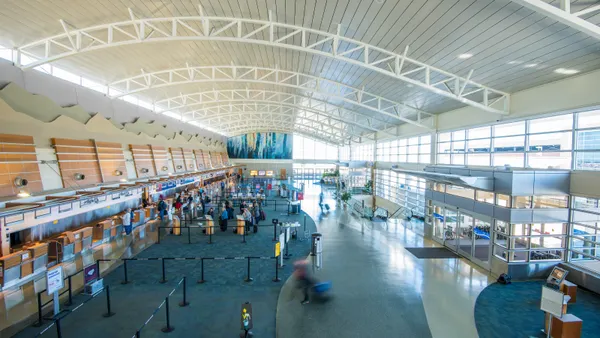Dive Brief:
- Construction equipment is getting "smart," thanks to radio frequency location, the Internet of Things and Texas-based startup Primal Sensors, AustinInno reported. The company is raising a $500,000 investment this year and plans to deploy and test its equipment tracking system in real-world situations.
- Primal Sensors uses a subscription-based system of three beacons placed throughout a construction site and small sensors attached to selected equipment, from hand tools to vehicles. The beacons track the equipment via the sensors and report the location data to a software platform. The company provides the sensors, beacons and software, and users can move the tracking system from one site to another.
- Co-founder Jerry King originally began development of the tracking system as a way for people to keep track of their friends at public events and other venues where groups can be easily separated in a crowd. He and technology expert Andrew Davis eventually decided to focus on the construction industry, where the two are considering the idea of integration with other construction tech companies like PlanGrid, which announced a $40 million investment last year, and Procore.
Dive Insight:
On a construction site, Primal Sensors' system would most likely be used to track progress among the many contractors and subcontractors that work on major project sites for a few months to complete their specific phases of work, according to AustinInno. The team envisions that general contractors will tag equipment entering the site and track them on a laptop screen.
"What they're getting is the transparency to see anything that's on site," King told AustinInno. "Where are the pallets, where are the tools. They'll know where things are and be able to prepare for what's (happening) next week and be able to be ready to go without wasting time."
Larger contractors and subs might also be able to use the Primal Sensors system to simply track equipment in an effort to stymie unauthorized "borrowing" and even outright theft of equipment from the jobsite.
Primal Sensors joins the ranks of other recent construction technology innovators, like predictive data analytics company Uptake Technologies, which was recently named Forbes’ 2015 hottest startup. Caterpillar-backed Uptake creates software-as-a-service products that stream sensor-based performance and maintenance data to users about the condition of equipment, better predicting malfunctions.
Fieldwire is another newcomer that offers mobile and web platform services for construction projects, while women-owned Bridgit has created a construction "punch list" app, Closeout, which the owners presented at this year’s Google Demo Day: Women’s Edition. Navy veterans are behind mobile platform Rhumbix, which collects data from construction workers' smartphones and provides the information to construction managers, and BuildingConnected burst onto the scene with its construction bid management platform.
Construction industry veteran Autodesk also made a leap into another area of construction technology last year with an investment in drone startup Skycatch. Skycatch drones will collect aerial data about construction sites, and Autodesk ReCap software will process the information for use by designers, engineers, architects, BIM managers and other AEC professionals.
King said that while most of the latest construction technology innovation has been on the pre-planning and design sides, Primal Sensors focuses on operations.
"The construction industry itself has been adopting new technology over the last 10 years," King told AustinInno. "It's kind of late to the game when it comes to developing more efficient processes. It's people-driven. It's a human experience. But it's not one that’s so gung-ho about replacing people that it's adopting a ton of technology. But it's going there."









